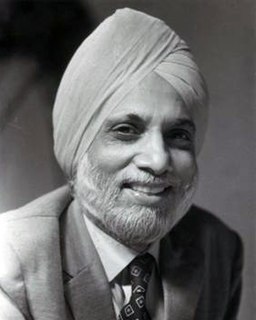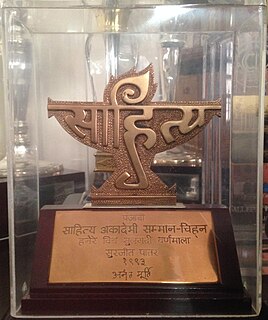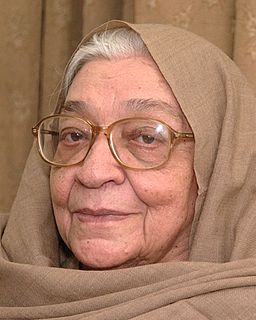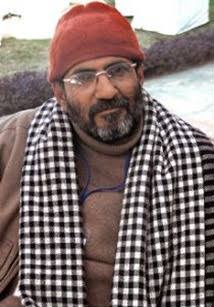
Kartar Singh Duggal was an Indian writer who wrote in Punjabi, Urdu, Hindi, and English. His works include short stories, novels, dramas and plays. His works have been translated into Indian and foreign languages. He has served as Director, All India Radio.
Kanhaiyalal Sethia was a well-known Rajasthani and Hindi poet. He was born in Sujangarh, Churu District in the Indian state of Rajasthan. He was a passionate supporter of making Rajasthani, the mother tongue of the people of Rajasthan, at the union level. He was a government-recognized freedom fighter, social worker, reformer, philanthropist and environmentalist.
Abdul Vaheed is a well-known author in the Rajasthani language.
Lakshmi Kumari Chundawat was an Indian author and politician from Rajasthan.

The Sahitya Academy Award is a literary honor in India, which the Sahitya Akademi, India's National Academy of Letters, annually confers on writers of the most outstanding books of literary merit published in any of the major Indian languages recognised by the Sahitya Akademi, New Delhi.

Gopi Chand Narang is an Indian theorist, literary critic and scholar who writes in Urdu and English. His Urdu literary criticism has incorporated a range of modern theoretical frameworks including stylistics, structuralism, post-structuralism and Eastern poetics.
Vijaydan Detha, also known as Bijji, was a noted writer from Rajasthan and a recipient of the Padma Shri award. He was also recipient of several other awards such as the Sahitya Akademi Award.
Ram Gopal Vijayvargiya was an Indian painter. He was also a poet and a writer.
Sitaram Lalas was a linguist and lexicographer of India.

Krishna Sobti was an Indian Hindi-language fiction writer and essayist. She won the Sahitya Akademi Award in 1980 for her novel Zindaginama and in 1996, was awarded the Sahitya Akademi Fellowship, the highest award of the Akademi. In 2017, she received the Jnanpith Award for her contribution to Indian literature.

Sitakant Mahapatra is an eminent Indian poet and literary critic in Odia as well as English. He was in the Indian Administrative Service (IAS) since 1961 until retiring in 1995, and has held ex officio posts such as the Chairman of National Book Trust, New Delhi since then.
Zahoor Khan Mehar has written several books on the history and culture of Rajasthan.
Chandra Prakash Deval is a Rajasthani poet and translator. He is also the convener of Rajasthani Advisory Council of Sahitya Akademi.

Dr. Arjun Deo Charan is a noted Rajasthani poet, critic, playwright, theatre director and translator.Dr. Arjun Deo Charan is prominent figure in Indian theatre, he shares his position in top 10 theatre personalities of country with Habib Tanvir and Ratan Thiyam . Dr. Charan was born on 10 May 1954 in the village of Mathania, Jodhpur. His father Renvat dan Charan also was a eminent Rajasthani poet and socialist, who had won Sahitya Akademi Award for his notable work Uchhalo. Charan has been the Head of Department of Rajasthani Language in the Jai Narain Vyas University, Jodhpur. He has been selected as Chairman of Rajasthan Sangeet Natak Akademi, Jodhpur on 26 November 2011 for three years.
Nilmani Phookan is an Indian poet in Assamese language and an academic. His work, replete with symbolism, is inspired by French symbolism and is representative of the genre in Assamese poetry. His notable works include Surya Henu Nami Ahe Ei Nodiyedi, Gulapi Jamur Lagna, and Kobita.
Saubhagya Singh Shekhawat is an Indian Rajasthani language writer.

Shanno Khurana is a noted Indian classical vocalist and composer, from the Rampur-Sahaswan gharana of Hindustani classical music. A disciple of the doyen of the gharana, Ustad Mushtaq Hussain Khan, she is known for performing rare bandish and raag, though her singing style includes genres like khayal, tarana, thumri, dadra, tappa, to chaiti and bhajan. Born and brought up in Jodhpur, she started singing on All India Radio in 1945 in Lahore, later shifted to Delhi, where she continued her singing on All India Radio, Delhi and in concerts and music festivals. She also pursued music education, finally earning her M. Phil. and PhD in music from the Kairagarh University, and has undertakes extensive research on folk music of Rajasthan.
Ningthoukhongjam Khelchandra Singh was an Indian writer, lexicographer and historian, known as the author of Manipuri to Manipuri and English, the first modern general dictionary in Meitei language, which was published in 1964. He was a fellow of the Sahitya Akademi and Sangeet Natak Akademi. The Government of India awarded him the fourth highest civilian honour of Padma Shri in 1987.
Gadul Singh Lama, popularly known as Sanu Lama, is an Indian fiction writer, poet and translator of Nepali literature. An engineer by profession, he has published three short story anthologies and his stories have been translated into English, Hindi, Urdu, Assamese and Oriya languages. He is a recipient of Sahitya Akademi Award (1993), apart from other awards such as Sikkim Bhanu Puraskar, Dr. Shova Kanti Thegim Smrithi Puraskar and Madan Byakhanmala Puraskar. The Government of India awarded him the fourth highest civilian honour of the Padma Shri, in 2005, for his contributions to literature.









